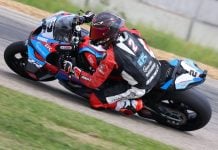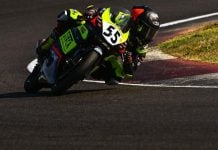When asked about reports that DMG will adopt World Superbike rules for the headlined Factory Superbike class in the 2009 AMA Superbike Series, Mel Harris, American Suzuki Vice President of Motorcycle/Marine Operations, said he saw a “foundation or platform” between the factories and DMG “coming closer.” “I think that we here at Suzuki would feel comfortable about that (running a World Superbike-spec class in the United States),” Harris says. “It makes the bikes the same spec, the same rules, around the world. As we look toward the future, that would be the way to go. I think it would make it much easier for all of us to conform, to do things that everyone else is doing. I think it’s a good direction and good vision to be heading.” Harris says that Suzuki would have to look at DMG’s final proposal before deciding whether or not to support a manufacturer-backed rival road racing series, a possibility raised by the Motorcycle Industry Council late last month. “A lot of this is all premature. And the MIC’s proposal may have existing classes as we see them now in AMA racing,” Harris says. “I see a foundation or a platform (between the manufacturers and DMG) coming closer. But we need to see the complete DMG package before you can make a good, strong decision. “I think we’ve all tried to make clear – no one’s ever slammed the door on DMG. But they need to know what we need to sell product. They have to understand that. I think that was missing from Day One.” Adopting the WSB-spec rules in the U.S. might not mean a sudden influx of even higher-tech, higher-cost Superbikes. It may well mean that worldwide, the definition of “Superbike” will evolve to represent bikes that are less high-tech and cheaper to campaign. Cost is a real concern to the manufacturers, Harris says. The establishment of a common Superbike-spec would mean that manufacturers could start to look at ways of cutting the costs of Superbikes worldwide, rather than trying to create cost-savings within a patchwork quilt of national and international regulations. “If you’re running Formula Xtreme and Superbike, you’ve got a hefty parts bill and development costs,” Harris says. “I can’t speak to what the factories are going to do, but I think that there are steps being considered right now that would put those (1000cc) bikes into a less expensive format for racing. “I know the factories are very much aware of costs. There’s a lot of money being spent on racing. That’s getting looked at right now by all the factories – how to race 1000s in a safe manner, in a more cost-effective manner.” What is needed in the U.S., Harris says, are four classes on race weekend – two for the manufacturers or factory teams to show off their 1000s and 600s (“We want to showcase our 600s, too,” Harris says), and two for privateers. Right now, Harris says, only the Superstock class provides a place for privateers to really show their talents. Manufacturers are running factory-spec machines in both Supersport and Formula Xtreme, leaving privateers to fight for the scraps in those classes. Having two classes to race in is important for privateers, because it gives them two chances to win purse money. And the privateer classes are the classrooms where the next factory riders learn their craft. Keeping privateers in the game is important, as are programs like the Red Bull AMA U.S. Rookies Cup. Harris says that in his view, spec tire rules slow the development of tires for racing and street purposes, and that competition between tire manufacturers is important, so he is not in favor of a spec tire rule. But with rising oil prices, spec fuels become more and more desirable. FIM President Vito Ippolito has said that he wants to see World Superbike regulations closer to production machines (think what is now known as Superstock) by 2010. Ippolito first spoke about moving Superbike in that direction in an interview with Roadracing World in late 2006. With AMA adopting the FIM World Superbike rules in 2009 and beyond, it could be easier for AMA riders to move into the World Superbike series. DMG’s emphasis on 600cc machines in the Daytona Superbike class should also make it easier for American riders to move into MotoGP, after the 250cc two-stroke class in that series is replaced with what Carmelo Ezpeleta (CEO of series promoter Dorna) has described as being a 600cc four-stroke series that may feature spec engines in prototype chassis.
Suzuki’s Mel Harris Comments On DMG’s Move To FIM World Superbike Rules
Suzuki’s Mel Harris Comments On DMG’s Move To FIM World Superbike Rules
© 2008, Roadracing World Publishing, Inc. By Michael Gougis.






